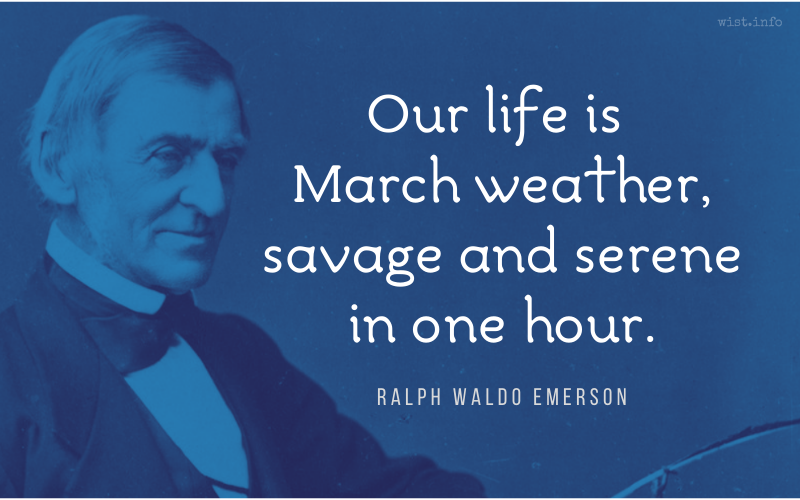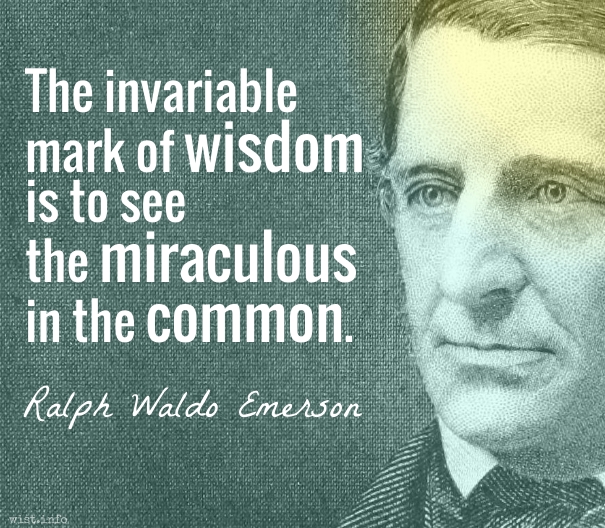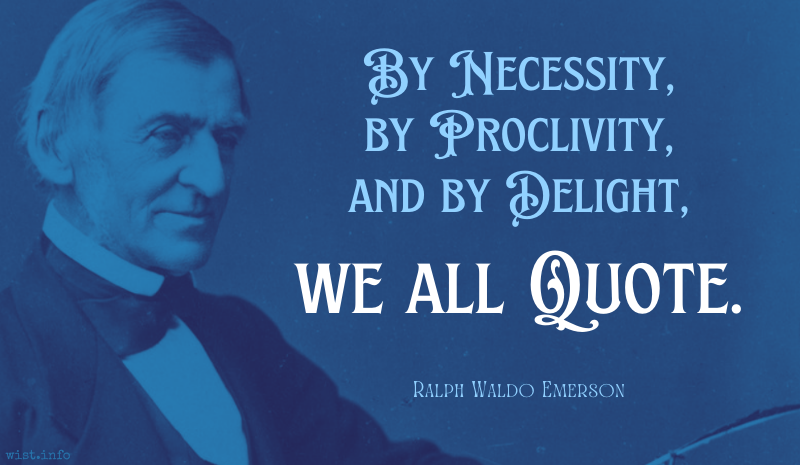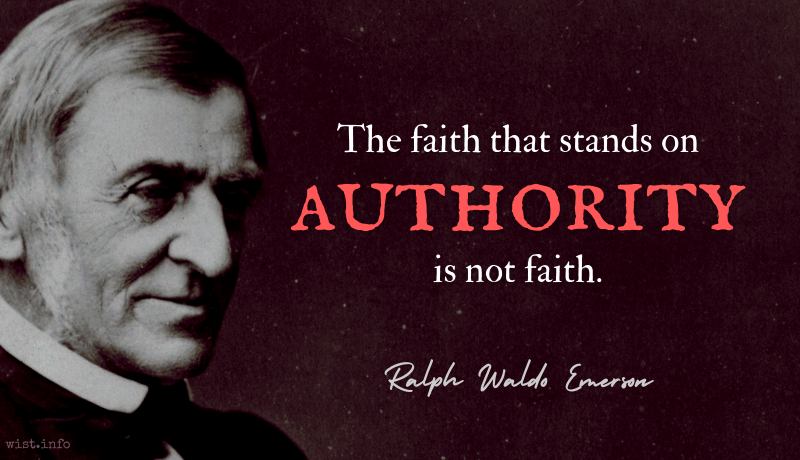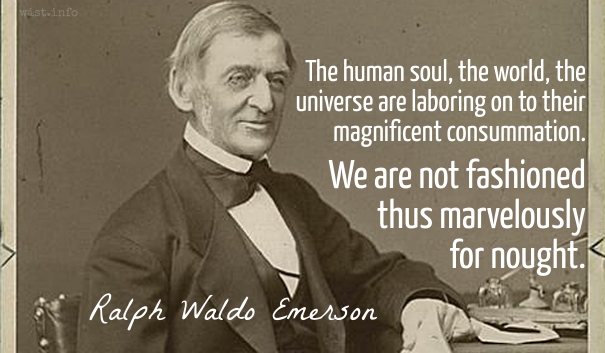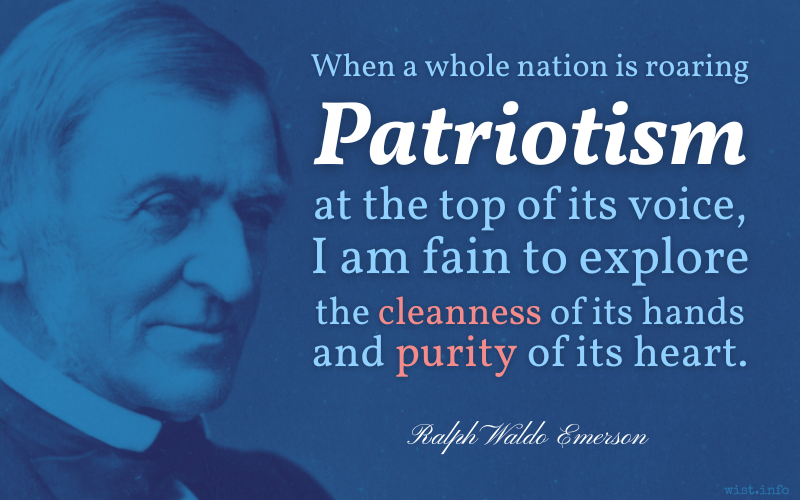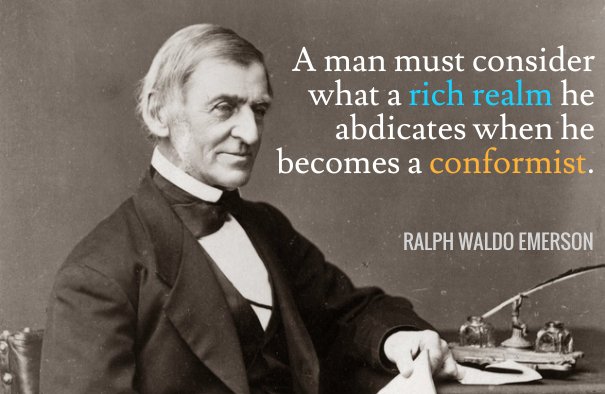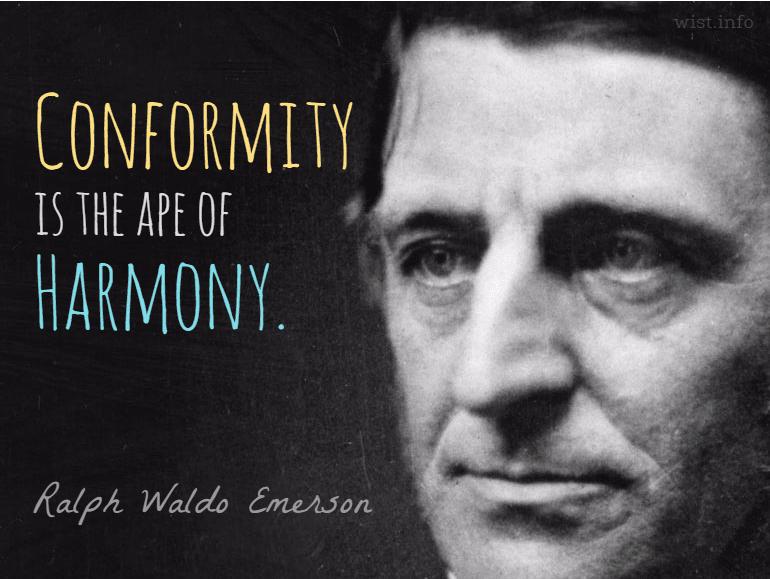Ideas must work through the brains and the arms of good and brave men, or they are no better than dreams.
Ralph Waldo Emerson (1803-1882) American essayist, lecturer, poet
“American Civilization,” lecture, Smithsonian Institution, Washington, DC (1862-01-31)
(Source)
Quotations by:
Emerson, Ralph Waldo
Gross and obscure natures, however decorated, seem impure shambles; but character gives splendor to youth, and awe to wrinkled skin and gray hairs.
Ralph Waldo Emerson (1803-1882) American essayist, lecturer, poet
“Beauty,” The Conduct of Life (1860)
(Source)
Consider what you have in the smallest chosen library. A company of the wisest and wittiest men that could be picked out of all civil countries, in a thousand years, have set in best order the results of their learning and wisdom. The men themselves were hid and inaccessible, solitary, impatient of interruption, fenced by etiquette; but the thought which they did not uncover to their bosom friend is here written out in transparent words to us, the strangers of another age.
We grant no dukedoms to the few,
We hold like rights and shall; —
Equal on Sunday in the pew,
On Monday in the mall.
For what avail the plough or sail,
Or land or life, if freedom fail?
We boast our emancipation from many superstitions; but if we have broken any idols, it is through a transfer of idolatry. What have I gained, that I no longer immolate a bull to Jove or to Neptune, or a mouse to Hecate; that I do not tremble before the Eumenides, or the Catholic Purgatory, or the Calvinistic Judgment-day, — if I quake at opinion, the public opinion as we call it; or at the threat of assault, or contumely, or bad neighbors, or poverty, or mutilation, or at the rumor of revolution, or of murder? If I quake, what matters it what I quake at?
Ralph Waldo Emerson (1803-1882) American essayist, lecturer, poet
“Character,” Essays: Second Series (1844)
(Source)
The virtues of society are the vices of the saint. The terror of reform is the discovery that we must cast away our virtues, or what we have always esteemed such, into the same pit that has consumed our grosser vices.
Ralph Waldo Emerson (1803-1882) American essayist, lecturer, poet
“Circles,” Essays: First Series (1841)
(Source)
No facts are to me sacred; none are profane; I simply experiment, an endless seeker, with no Past at my back.
Ralph Waldo Emerson (1803-1882) American essayist, lecturer, poet
“Circles,” Essays: First Series (1841)
(Source)
People wish to be settled; only as far as they are unsettled is there is any hope for them.
Ralph Waldo Emerson (1803-1882) American essayist, lecturer, poet
“Circles,” Essays: First Series (1841)
(Source)
Experienced men of the world know very well that it is best to pay scot and lot as they go along, and that a man often pays dear for a small frugality.
Ralph Waldo Emerson (1803-1882) American essayist, lecturer, poet
“Compensation,” Essays: First Series (1841)
(Source)
In general, every evil to which we do not succumb is a benefactor. As the Sandwich Islander believes that the strength and valor of the enemy he kills passes into himself, so we gain the strength of the temptation we resist.
Ralph Waldo Emerson (1803-1882) American essayist, lecturer, poet
“Compensation,” Essays: First Series (1841)
(Source)
Most of the great results of history are brought about by discreditable means.
Ralph Waldo Emerson (1803-1882) American essayist, lecturer, poet
“Considerations by the Way,” The Conduct of Life, ch. 7 (1860)
(Source)
A great part of courage is the courage of having done the thing before.
Ralph Waldo Emerson (1803-1882) American essayist, lecturer, poet
“Culture,” The Conduct of Life, ch. 4 (1860)
(Source)
He has not learned the lesson of life who does not every day surmount a fear.
Ralph Waldo Emerson (1803-1882) American essayist, lecturer, poet
“Culture,” The Conduct of Life, ch. 4 (1860)
(Source)
The ornament of a house is the friends who frequent it. There is no event greater in life than the appearance of new persons about our hearth, except it be the progress of the character which draws them.
Ralph Waldo Emerson (1803-1882) American essayist, lecturer, poet
“Domestic Life,” Society and Solitude (1870)
(Source)
It is easy in the world to live after the world’s opinion; it is easy in solitude to live after our own. But the great man is he who in the midst of the crowd keeps with perfect sweetness the independence of solitude.
Nature, as we know her, is no saint.
Ralph Waldo Emerson (1803-1882) American essayist, lecturer, poet
“Experience,” Essays: Second Series (1844)
(Source)
That which we call sin in others, is experiment for us.
Ralph Waldo Emerson (1803-1882) American essayist, lecturer, poet
“Experience,” Essays: Second Series (1844)
(Source)
To finish the moment, to find the journey’s end in every step of the road, to live the greatest number of good hours, is wisdom.
Ralph Waldo Emerson (1803-1882) American essayist, lecturer, poet
“Experience,” Essays: Second Series (1844)
(Source)
We do what we must, and call it by the best names we can, and would fain have the praise of having intended the result which ensues.
Ralph Waldo Emerson (1803-1882) American essayist, lecturer, poet
“Experience,” Essays: Second Series (1844)
(Source)
You have just dined, and however scrupulously the slaughterhouse is concealed in the graceful distance of miles, there is complicity ….
Ralph Waldo Emerson (1803-1882) American essayist, lecturer, poet
“Fate,” The Conduct of Life, ch. 1 (1860)
(Source)
We do not quite forgive a giver. The hand that feeds us is in some danger of being bitten. We can receive anything from love, for that is a way of receiving it from ourselves; but not from any one who assumes to bestow.
Ralph Waldo Emerson (1803-1882) American essayist, lecturer, poet
“Gifts,” Essays: Second Series, No. 5 (1844)
(Source)
The only gift is a portion of thyself. Thou must bleed for me. Therefore the poet brings his poem; the shepherd, his lamb; the farmer, corn; the miner, a gem; the sailor, coral and shells; the painter, his picture; the girl, a handkerchief of her own sewing.
Ralph Waldo Emerson (1803-1882) American essayist, lecturer, poet
“Gifts,” Essays: Second Series, No. 5 (1844).
(Source)
Shall I tell you the secret of the true scholar? It is this: Every man I meet is my master in some point, and in that I learn of him.
Ralph Waldo Emerson (1803-1882) American essayist, lecturer, poet
“Greatness,” Letters and Social Aims (1876)
(Source)
This appears to be the origin of the much more common paraphrase (not found in Emerson's works, but popularized by Dale Carnegie in How to Win Friends and Influence People (1936)): "In my walks, every man I meet is my superior in some way, and in that, I learn from him."
Be true to your own act, and congratulate yourself if you have done something strange and extravagant, and broken the monotony of a decorous age. It was a high counsel that I once heard given to a young person, “Always do what you are afraid to do.”
Ralph Waldo Emerson (1803-1882) American essayist, lecturer, poet
“Heroism,” Essays: First Series (1841)
See also Schmich.
Every man is a divinity in disguise, a god playing the fool. It seems as if heaven had sent its insane angels into our world as to an asylum, and here they will break out into their native music and utter at intervals the words they have heard in heaven; and then the mad fit returns, and they mope and wallow like dogs.
Ralph Waldo Emerson (1803-1882) American essayist, lecturer, poet
“History,” Essays: First Series (1841)
(Source)
Sufficient to today are the duties of today. Don’t waste life in doubts and fears; spend yourself on the work before you, well assured that the right performance of this hour’s duties will be the best preparation for the hours and ages that will follow it.
Ralph Waldo Emerson (1803-1882) American essayist, lecturer, poet
“Immortality,” Letters and Social Aims (1876)
(Source)
God offers to every mind its choice between truth and repose. Take which you please — you can never have both.
Ralph Waldo Emerson (1803-1882) American essayist, lecturer, poet
“Intellect,” Essays: First Series (1841)
(Source)
There comes now and then a bolder spirit, I should rather say, a more surrendered soul, more informed and led by God, which is much in advance of the rest, quite beyond their sympathy, but predicts what shall soon be the general fullness; as when we stand by the seashore, whilst the tide is coming in, a wave comes up the beach far higher than any foregoing one, and recedes; and for a long while none comes up to that mark; but after some time the whole sea is there and beyond it.
Ralph Waldo Emerson (1803-1882) American essayist, lecturer, poet
“Lecture on the Times,” Boston (1841-12-02)
(Source)
Love would put a new face on this weary old world in which we dwell as pagans and enemies too long.
Ralph Waldo Emerson (1803-1882) American essayist, lecturer, poet
“Man the Reformer,” lecture, Boston (1841-01-25)
(Source)
The trail of the serpent reaches into all the lucrative professions and practices of man, Each has its own wrongs. Each finds a tender and very intelligent conscience a disqualification for success. Each requires of the practitioner a certain shutting of the eyes, a certain dapperness and compliance, an acceptance of customs, a sequestration from the sentiments of generosity and love, a compromise of private opinion and lofty integrity.
Ralph Waldo Emerson (1803-1882) American essayist, lecturer, poet
“Man the Reformer,” lecture, Boston (1841-01-25)
(Source)
When I go into my garden with a spade and dig a bed, I feel such an exhilaration and health, that I discover that I have been defrauding myself all this time in letting others do for me what I should have done with my own hands.
Ralph Waldo Emerson (1803-1882) American essayist, lecturer, poet
“Man the Reformer,” lecture, Boston (1841-01-25)
(Source)
Man helps himself by larger generalizations. The lesson of life is practically to generalize; to believe what the years and the centuries say, against the hours; to resist the usurpation of particulars; to penetrate to their catholic sense. Things seem to say one thing, and say the reverse. The appearance is immoral; the result is moral.
Ralph Waldo Emerson (1803-1882) American essayist, lecturer, poet
“Montaigne; or, The Skeptic,” Representative Men, Lecture 4 (1850)
(Source)
Things seem to tend downward, to justify despondency, to promote rogues, to defeat the just; and by knaves as well as by martyrs the just cause is carried forward. Although knaves win in every political struggle, although society seems to be delivered over from the hands of one set of criminals into the hands of another set of criminals, as fast as the government is changed, and the march of civilization is a train of felonies, yet, general ends are somehow answered.
Ralph Waldo Emerson (1803-1882) American essayist, lecturer, poet
“Montaigne; or, The Skeptic,” Representative Men, Lecture 4 (1850)
(Source)
Keep cool: it will be all one a hundred years hence.
Ralph Waldo Emerson (1803-1882) American essayist, lecturer, poet
“Montaigne; or, The Skeptic,” Representative Men, Lecture 4 (1850)
(Source)
Our life is March weather, savage and serene in one hour.
Ralph Waldo Emerson (1803-1882) American essayist, lecturer, poet
“Montaigne; or, The Skeptic,” Representative Men, Lecture 4 (1850)
(Source)
As long as our civilization is essentially one of property, of fences, of exclusiveness, it will be mocked by delusions. Our riches will leave us sick; there will be bitterness in our laughter; and our wine will burn our mouth. Only that good profits which we can taste with all doors open, and which serves all men.
Ralph Waldo Emerson (1803-1882) American essayist, lecturer, poet
“Napoleon; or, The Man of the World,” Representative Men, Lecture 6 (1850)
(Source)
We aim above the mark to hit the mark.
Ralph Waldo Emerson (1803-1882) American essayist, lecturer, poet
“Nature,” Essays: Second Series (1844)
(Source)
Great causes are never tried on their merits; but the cause is reduced to particulars to suit the size of the partisans, and the contention is ever hottest on minor matters.
Ralph Waldo Emerson (1803-1882) American essayist, lecturer, poet
“Nature,” Essays: Second Series (1844)
(Source)
In the woods too, a man casts off his years, as the snake his slough, and at what period soever of life, is always a child. In the woods, is perpetual youth. Within these plantations of God, a decorum and sanctity reign, a perennial festival is dressed, and the guest sees not how he should tire of them in a thousand years. In the woods, we return to reason and faith. There I feel that nothing can befall me in life, — no disgrace, no calamity, (leaving me my eyes,) which nature cannot repair. Standing on the bare ground, — my head bathed by the blithe air, and uplifted into infinite space, — all mean egotism vanishes. I become a transparent eye-ball; I am nothing; I see all; the currents of the Universal Being circulate through me; I am part or particle of God.
Ralph Waldo Emerson (1803-1882) American essayist, lecturer, poet
“Nature,” ch. 1, Nature: Addresses and Lectures (1849)
(Source)
The invariable mark of wisdom is to see the miraculous in the common.
Ralph Waldo Emerson (1803-1882) American essayist, lecturer, poet
“Nature,” ch. 8, Nature: Addresses and Lectures (1849)
(Source)
A man is a god in ruins.
Ralph Waldo Emerson (1803-1882) American essayist, lecturer, poet
“Nature,” ch. 8, Nature: Addresses and Lectures (1849)
(Source)
We must trust the perfection of the creation so far, as to believe that whatever curiosity the order of things has awakened in our minds, the order of things can satisfy.
Ralph Waldo Emerson (1803-1882) American essayist, lecturer, poet
“Nature,” Introduction, Nature: Addresses and Lectures (1849)
(Source)
The reward of a thing well done, is to have done it.
Ralph Waldo Emerson (1803-1882) American essayist, lecturer, poet
“New England Reformers,” lecture, Boston (1844-03-03), Essays: Second Series (1844)
(Source)
Reprinted in Essays: Second Series (1844).
Men are conservatives when they are least vigorous, or when they are most luxurious. They are conservatives, after dinner, or before taking their rest; when they are sick, or aged: in the morning, or when their intellect or their conscience have been aroused, when they hear music, or when they read poetry, they are radicals.
Ralph Waldo Emerson (1803-1882) American essayist, lecturer, poet
“New England Reformers,” lecture, Boston (1844-03-03), Essays: Second Series (1844)
(Source)
A man’s action is only a picture-book of his creed.
Ralph Waldo Emerson (1803-1882) American essayist, lecturer, poet
“Poetry and Imagination,” Letters and Social Aims (1876)
(Source)
What the tender poetic youth dreams, and prays, and paints to-day, but shuns the ridicule of saying aloud, shall presently be the resolutions of public bodies, then shall be carried as grievance and bill of rights through conflict and war, and then shall be triumphant law and establishment for a hundred years, until it gives place, in turn, to new prayers and pictures.
Ralph Waldo Emerson (1803-1882) American essayist, lecturer, poet
“Politics,” Essays: Second Series (1844)
(Source)
This quotation is more often given as the paraphrase used by another speaker of the era, the abolitionist Wendell Phillips:
What the tender and poetic youth dreams to-day, and conjures up with inarticulate speech, is to-morrow the vociferated result of public opinion, and the day after is the charter of nations.
Phillips used this phrase, prefixed with, "As Emerson says," and in quotation marks, at least twice. First in his lecture "Harper's Ferry" (1 Nov 1859), Brooklyn. Second, in a different context, in "The Scholar in a Republic" (30 Jun 1881), a famous speech at the centennial of the Phi Beta Kappa society at Harvard University.
Emerson did not use this shorter phrasing, however, in any of his written works, and frequent attributions of it to him are in error.
In our flowing affairs a decision must be made — the best, if you can, but any is better than none. There are twenty ways of going to a point, and one is the shortest; but set out at once on one. A man who has that presence of mind which can bring to him the instant all he knows, is worth for action a dozen men who know as much but can only bring it to light slowly.
Concentration is the secret of strength in politics, in war, in trade, in short, in all management of human affairs.
Ralph Waldo Emerson (1803-1882) American essayist, lecturer, poet
“Power,” The Conduct of Life, ch. 2 (1860)
(Source)
All great masters are chiefly distinguished by the power of adding a second, a third, and perhaps a fourth step in a continuous line. Many a man had taken the first step. With every additional step you enhance immensely the value of your first.
Ralph Waldo Emerson (1803-1882) American essayist, lecturer, poet
“Powers and Laws of Thought,” Natural History of Intellect, Lecture 1, Harvard (1870, Spring)
(Source)
Every artist was first an amateur.
Ralph Waldo Emerson (1803-1882) American essayist, lecturer, poet
“Progress of Culture,” Letters and Social Aims (1876)
Full text.
If the hive be disturbed by rash and stupid hands, instead of honey, it will yield us bees.
Ralph Waldo Emerson (1803-1882) American essayist, lecturer, poet
“Prudence,” Essays: First Series, ch. 7 (1841)
(Source)
Our debt to tradition through reading and conversation is so massive, our protest or private addition so rare and insignificant, — and this commonly on the ground of other reading or hearing, — that, in a large sense, one would say there is no pure originality. All minds quote. Old and new make the warp and woof of every moment. There is no thread that is not a twist of these two strands. By necessity, by proclivity, and by delight, we all quote.
Ralph Waldo Emerson (1803-1882) American essayist, lecturer, poet
“Quotation and Originality,” Letters and Social Aims (1876)
(Source)
The profit of books is according to the sensibility of the reader. The profoundest thought or passion sleeps as in a mine, until an equal mind and heart finds and publishes it.
Nature is too thin a screen, — the glory of the One breaks in everywhere.
Ralph Waldo Emerson (1803-1882) American essayist, lecturer, poet
“Religion,” The Present Age Lecture 7, Boston (1840-01-29)
(Source)
Lecture series initially presented 4 Dec 1839 - 12 Feb 1840. This particular phrase can be found in Emerson's writing going back to 1837. It also was reused in his Cambridge lecture, "The Preacher" (5 May 1879), in a somewhat different context.
The phrase is also rendered "Nature is too thin a screen; the glory of the omnipresent God bursts through everywhere."
With consistency a great soul has simply nothing to do. He may as well concern himself with his shadow on the wall. Speak what you think to-day in words as hard as cannon-balls and to-morrow speak what to-morrow thinks in hard words again, though it contradict every thing you said to-day.
God will not have his work made manifest by cowards.
Ralph Waldo Emerson (1803-1882) American essayist, lecturer, poet
“Self-Reliance,” Essays: First Series (1841)
(Source)
Preliminary work, including this phrase, is found in Emerson's journal (13 Jan 1833).
It is easy in the world to live after the world’s opinion; it is easy in solitude to live after our own; but the great man is he who, in the midst of the crowd, keeps with perfect sweetness the independence of solitude.
If I know your sect, I anticipate your argument.
Ralph Waldo Emerson (1803-1882) American essayist, lecturer, poet
“Self-Reliance,” Essays: First Series (1841)
(Source)
When people come to see us, we foolishly prattle, lest we be inhospitable. But things said for conversation are chalk eggs. Don’t say things. What you are stands over you the while, and thunders so that I cannot hear what you say to the contrary.
Ralph Waldo Emerson (1803-1882) American essayist, lecturer, poet
“Social Aims,” lecture, Boston (1864-12-04), Letters and Social Aims (1875)
(Source)
Likely source of the abridgments more commonly found *in:More discussion of this quotation: What You Do Speaks So Loudly that I Cannot Hear What You Say – Quote Investigator
- "What you do speaks so loudly that I cannot hear what you say."
- "What you are speaks so loudly that I cannot hear what you say."
- "Who you are speaks so loudly that I cannot hear what you say."
- "What we are speaks louder than what we say." [John F Kennedy, Q&A, Salt Lake City (23 Sep 1960), and in numerous subsequent speeches]
A man makes his inferiors his superiors by heat. […] Self-control is the rule.
Ralph Waldo Emerson (1803-1882) American essayist, lecturer, poet
“Social Aims,” lecture, Boston (1864-12-04), Letters and Social Aims (1875)
(Source)
Good manners are made up of petty sacrifices.
Ralph Waldo Emerson (1803-1882) American essayist, lecturer, poet
“Social Aims,” lecture, Boston (1864-12-04), Letters and Social Aims (1875)
(Source)
For behavior, men learn it, as they take diseases, one of another.
Ralph Waldo Emerson (1803-1882) American essayist, lecturer, poet
“Solitude and Society,” Atlantic Monthly (1857-12)
Paraphrase of Shakespeare, King Henry IV, Part 2, Act 5, sc. 1: "It is certain that either wife bearing or ignorant carriage is caught, as men take diseases, one of another: therefore let men take heed of their company." Sometimes misattributed to Francis Bacon.
I have seen a man of genius who made one think if other men were like him, cooperation were impossible. Must we always talk for victory, and never once for truth, for comfort, and joy?
Ralph Waldo Emerson (1803-1882) American essayist, lecturer, poet
“Table Talk,” American Life, lecture, Boston (1864-12-18)
(Source)
Speaking of Thoreau's style of conversation. Originally a Journal entry of 29 Feb 1856. Also part of the lecture "Social Aims".
Character is higher than intellect.
Ralph Waldo Emerson (1803-1882) American essayist, lecturer, poet
“The American Scholar,” sec. 3, speech, Phi Beta Kappa Society, Cambridge (1837-08-31)
(Source)
It is only when they cannot answer your reasons, that they wish to knock you down.
Ralph Waldo Emerson (1803-1882) American essayist, lecturer, poet
“The Assault upon Mr. Sumner,” speech, Concord (1856-05-26)
(Source)
When Carlini was convulsing Naples with laughter, a patient waited on a physician in that city, to obtain some remedy for excessive melancholy, which was rapidly consuming his life. The physician endeavored to cheer his spirits, and advised him to go to the theater and see Carlini. He replied, “I am Carlini.”
The gracious lesson taught by science to this country is that the history of Nature from first to last is incessant advance from less to more, from rude to finer organization, the globe of matter thus conspiring with the principle of undying hope in man. Nature works in immense time, and spends individuals and races prodigally to prepare new individuals and races.
Ralph Waldo Emerson (1803-1882) American essayist, lecturer, poet
“The Fortune of the Republic,” lecture, Boston (1878-03-30)
(Source)
Final version of a lecture first given in 1863, and his last public speech.
In a virtuous community men of sense and principle will always be placed at the head of affairs. In a declining state of public morals men will be so blinded to their true interests as to put the incapable and unworthy at the helm. It is therefore vain to complain of the follies or crimes of a government. We must lay the hands on our own hearts and say, Here is the sin that makes the public sin.
The one condition coupled with the gift of truth is its use.
Ralph Waldo Emerson (1803-1882) American essayist, lecturer, poet
“The Method of Nature,” speech, Waterville College, Maine (1841-08-11)
(Source)
The faith that stands on authority is not faith. The reliance on authority measures the decline of religion, the withdrawal of the soul.
Ralph Waldo Emerson (1803-1882) American essayist, lecturer, poet
“The Over-Soul,” Essays: First Series, ch. 9 (1841)
(Source)
Once we had wooden chalices and golden priests, now we have golden chalices and wooden priests.
Ralph Waldo Emerson (1803-1882) American essayist, lecturer, poet
“The Preacher,” lecture, Cambridge (1879-05-05)
(Source)
I find myself always struck and stimulated by a good anecdote, any trait of heroism, of faithful service. I do not find that the age or country makes the least difference; no, nor the language the actor spoke, nor the religion which they professed, — whether Arab in the desert, or Frenchman in the Academy. I see that sensible men and conscientious men all over the world were of one religion of well-doing and daring, men of sturdy truth, men of integrity and feeling for others.
Ralph Waldo Emerson (1803-1882) American essayist, lecturer, poet
“The Preacher,” lecture, Cambridge (1879-05-05)
(Source)
Men run out of one superstition into an opposite superstition.
Ralph Waldo Emerson (1803-1882) American essayist, lecturer, poet
“The Scholar,” lecture, University of Virginia (1876-06-28)
(Source)
Every observation of history inspires a confidence that we shall not go far wrong; that things will mend.
Ralph Waldo Emerson (1803-1882) American essayist, lecturer, poet
“The Young American,” lecture, Mercantile Library Association, Boston (1844-02-07)
(Source)
The Bible is a sealed book to him who has not first heard its laws from his soul.
Ralph Waldo Emerson (1803-1882) American essayist, lecturer, poet
“Trust Yourself,” Sermon 90 (1830)
(Source)
Sermon on Matthew 16:26.
How ridiculous is Caesar and Bonaparte wandering from one extreme of civilization to the other to conquer men — himself, the while, unconquered, unexplored, almost wholly unsuspected to himself?
Ralph Waldo Emerson (1803-1882) American essayist, lecturer, poet
“Trust Yourself,” Sermon 90 (1830)
(Source)
Sermon on Matthew 16:26.
The more finished the character, the more striking is its individuality.
Ralph Waldo Emerson (1803-1882) American essayist, lecturer, poet
“Trust Yourself,” Sermon 90 (1830)
(Source)
Sermon on Matthew 16:26.
But a new danger appears in the excess of influence of the great man. His attractions warp us from our place. We have become underlings and intellectual suicides. Ah! yonder in the horizon is our help; — other great men, new qualities, counterweights and checks on each other. We cloy of the honey of each peculiar greatness. Every hero becomes a bore at last.
Ralph Waldo Emerson (1803-1882) American essayist, lecturer, poet
“Uses of Great Men,” Representative Men Lecture 1, Boston (1845-12-11)
(Source)
The shield against the stingings of conscience is the universal practice of our contemporaries. Again, it is very easy to be as wise and good as your companions.
Ralph Waldo Emerson (1803-1882) American essayist, lecturer, poet
“Uses of Great Men,” Representative Men Lecture 1, Boston (1845-12-11)
(Source)
The manhood that has been in war must be transferred to the cause of peace, before war can lose its charm, and peace be venerable to men.
Ralph Waldo Emerson (1803-1882) American essayist, lecturer, poet
“War,” lecture, Boston (1838-03), Aesthetic Papers, Article 3 (1849)
(Source)
Money often costs too much, and power and pleasure are not cheap.
Ralph Waldo Emerson (1803-1882) American essayist, lecturer, poet
“Wealth,” The Conduct of Life, ch. 3 (1860)
(Source)
Art is a jealous mistress, and, if a man have a genius for painting, poetry, music, architecture, or philosophy, he makes a bad husband and an ill provider.
Ralph Waldo Emerson (1803-1882) American essayist, lecturer, poet
“Wealth,” The Conduct of Life, ch. 3 (1860)
(Source)
Want is a growing giant whom the coat of Have was never large enough to cover.
Ralph Waldo Emerson (1803-1882) American essayist, lecturer, poet
“Wealth,” The Conduct of Life, ch. 3 (1860)
(Source)
Every man is a consumer, and ought to be a producer. He fails to make his place good in the world, unless he not only pays his debt, but also adds something to the common wealth.
Ralph Waldo Emerson (1803-1882) American essayist, lecturer, poet
“Wealth,” The Conduct of Life, ch. 3 (1860)
(Source)
Good luck is another name for tenacity of purpose.
Ralph Waldo Emerson (1803-1882) American essayist, lecturer, poet
“Wealth,” The Conduct of Life, ch. 3 (1860)
(Source)
A man builds a fine house; and now he has a master, and a task for life; he is to furnish, watch, show it, and keep it in repair, the rest of his days.
Ralph Waldo Emerson (1803-1882) American essayist, lecturer, poet
“Works and Days,” Society and Solitude, ch. 7 (1870)
(Source)
Can anyone remember when times were not hard, and money was not scarce?
Ralph Waldo Emerson (1803-1882) American essayist, lecturer, poet
“Works and Days,” Society and Solitude, ch. 7 (1870)
(Source)
Shallow men believe in luck, believe in circumstances — it was somebody’s name, or he happened to be there at the time, or it was so then, and another day would have been otherwise. Strong men believe in cause and effect.
Ralph Waldo Emerson (1803-1882) American essayist, lecturer, poet
“Worship,” The Conduct of Life, ch. 6 (1860)
(Source)
Every man takes care that his neighbor shall not cheat him. But a day comes when he begins to care that he do not cheat his neighbor. Then all goes well. He has changed his market cart for a chariot of the sun.
Ralph Waldo Emerson (1803-1882) American essayist, lecturer, poet
“Worship,” The Conduct of Life, ch. 6 (1860)
(Source)
People seem not to see that their opinion of the world is also a confession of character.
Ralph Waldo Emerson (1803-1882) American essayist, lecturer, poet
“Worship,” The Conduct of Life, ch. 6 (1860)
(Source)
Against all appearances the nature of things works for truth and right forever.
Ralph Waldo Emerson (1803-1882) American essayist, lecturer, poet
“Worship,” The Conduct of Life, ch. 6 (1860)
(Source)
The real and lasting victories are those of peace and not of war.
Ralph Waldo Emerson (1803-1882) American essayist, lecturer, poet
“Worship,” The Conduct of Life, ch. 6 (1860)
(Source)
We are born believing, A man bears beliefs as a tree bears apples.
Ralph Waldo Emerson (1803-1882) American essayist, lecturer, poet
“Worship,” The Conduct of Life, ch. 6 (1860)
(Source)
The glory of friendship is not the outstretched hand, nor the kindly smile nor the joy of companionship; it is the spiritual inspiration that comes to one when he discovers that someone else believes in him and is willing to trust him with his friendship.
The purpose of life is not to be happy. It is to be useful, to be honorable, to be compassionate, to have it make some difference that you have lived and lived well.
Ralph Waldo Emerson (1803-1882) American essayist, lecturer, poet
(Misattributed)
Though widely credited to Emerson, this appears to be a misattributed variation of a Leo Rosten quotation. More discussion of the connection here: The Purpose of Life Is Not To Be Happy But To Matter – Quote Investigator.
To laugh often and much; to win the respect of intelligent people and the affection of children; to earn the appreciation of honest critics and endure the betrayal of false friends; to appreciate beauty, to find the best in others; to leave the world a bit better, whether by a healthy child, a garden patch, or a redeemed social condition, to know even one life has breathed easier because you have lived. This is to have succeeded.
Ralph Waldo Emerson (1803-1882) American essayist, lecturer, poet
(Misattributed)
This is regularly attributed to Emerson, but has not been found in his work. The original appears to be a contest essay written by Bessie A. Stanley of Lincoln, Nebraska in 1905:
He has achieved success who has lived well, laughed often and loved much; who has gained the respect of intelligent men and the love of little children; who has filled his niche and accomplished his task; who has left the world better than he found it, whether by an improved poppy, a perfect poem, or a rescued soul; who has never lacked appreciation of earth’s beauty or failed to express it; who has always looked for the best in others and given the best he had; whose life was an inspiration; whose memory a benediction.
In 1951, Albert E. Wiggam, a newspaper columnist, wrote this similar passage, claiming it was an abridged version of something Emerson wrote:
To laugh often and love much; to win the respect of intelligent persons and the affection of children; to earn the approbation of honest critics and endure the betrayal of false friends; to appreciate beauty. To find the best in others; to give one’s self; to leave the world a bit better, whether by a healthy child, a garden patch or a redeemed social condition; to have played and laughed with enthusiasm and sung with exaltation; to know even one life has breathed easier because you have lived -- this is to have succeeded.
Variations of both quotations exist, but Wiggam seems to be the source of the Emerson reference. This was later cemented by Ann Landers producing the variation at the top of this post, citing Emerson but not Wiggam. She also at other times attributed it to Harry Emerson Fosdick and Bessie A. Stanley.
More information here:
A hero is no braver than an ordinary man, but he is braver five minutes longer.
Ralph Waldo Emerson (1803-1882) American essayist, lecturer, poet
(Spurious)
Frequently ascribed to him, especially in recent decades, but not found in his works.
More discussion about this quotation:
Write it on your heart that every day is the best day in the year. He is rich who owns the day, and no one owns the day who allows it to be invaded with fret and anxiety. Finish every day and be done with it. You have done what you could. Some blunders and absurdities, no doubt crept in. Forget them as soon as you can, tomorrow is a new day; begin it well and serenely, with too high a spirit to be cumbered with your old nonsense. This new day is too dear, with its hopes and invitations, to waste a moment on the yesterdays.
Ralph Waldo Emerson (1803-1882) American essayist, lecturer, poet
(Spurious)
This widely spread inspirational quotation is actually a piecing-together of multiple phrases from different sources, some not even Emerson. It includes bits from his essay "Works and Days" (here and here), observations on Emerson by Lillian Whiting, and fragments from a letter by him to his daughter Ellen.
The result sounds much like Emerson, but would require more ellipses than text to qualify as a quotation of him. It would be a great candidate for an AI "quotation" except that references to it can be found back in the 2010s, so it is almost certainly of human origin.
More detailed discussion: poetry - From which book or essay are these words by Ralph Waldo Emerson? "Write it on your heart that every day is the best day in the year..." - Literature Stack Exchange.
I confess I am a little cynical on some topics, and when a whole nation is roaring Patriotism at the top of its voice, I am fain to explore the cleanness of its hands and purity of its heart.
It is said public opinion will not bear it. Really? Public opinion, I am sorry to say, will bear a great deal of nonsense. There is scarce any absurdity so gross, whether in religion, politics, science, or manners, which it will not bear.
The great majority of men are bundles of beginnings. There is not one who has not felt the sacred fire of virtue many a time kindling up within him. He resolved to read, he resolved to give, he solved to abstain, to speak well, to think in a train, to serve God, to imitate Christ. Something he did toward realizing his purpose — but it was most unlucky time — some very unseasonable circumstances occurred and the good purpose was postponed. Who is there here who does not remember his defeats?
Riches are a trust. … Power is a trust. So also is genius or every degree of wisdom. … Talents are a trust, too; that is the condition of their increase. They must be put out to use, or they will ruin the steward.
Many eyes go through the meadow, but few see the flowers in it.
Observe the invincible tendency of the mind to unify. It is a law of our constitution that we should not contemplate things apart without the effort to arrange them in order with known facts and ascribe them to the same law.
Value of a Journal. A sentence now; a sentence last year; a sentence yesterday. Tomorrow a question comes that for the first time brings together these three and shows them to be the three fractions of Unit.
The meaning of good & bad, of better & worse, is simply helping or hurting.
It is one of the blessings of old friends that you can afford to be stupid with them.
Let me never fall into the vulgar mistake of dreaming that I am persecuted whenever I am contradicted.
I stir in it for the sad reason that no other mortal will move, and if I do not, why, it is left undone. The amount of it, be sure, is merely a Scream; but sometimes a scream is better than a thesis.
In nature nothing is done but in the cheapest way.
A man must consider what a rich realm he abdicates when he becomes a conformist.
Conformity is the ape of harmony.
We are all boarders on one table — White man, black man, ox and eagle, bee, & worm.
In the Feejee islands, it appears, cannibalism is now familiar. They eat their own wives and children. We only devour widows’ houses, & great merchants outwit & absorb the substance of small ones and every man feeds on his neighbor’s labor if he can. It is a milder form of cannibalism.
People say law, but they mean wealth.
Sorrow makes us all children again, destroys all difference of intellect. The wisest knows nothing.
Ralph Waldo Emerson (1803-1882) American essayist, lecturer, poet
Journal (1842-01-30)
(Source)
Two days after he recorded the death of his son.
Do not be too timid and squeamish about your actions. All life is an experiment. The more experiments you make the better. What if they are a little coarse, and you may get your coat soiled or torn? What if you do fail, and get fairly rolled in the dirt once or twice. Up again, you shall never be so afraid of a tumble.
Never strike a king unless you are sure you shall kill him.
Ralph Waldo Emerson (1803-1882) American essayist, lecturer, poet
Journal (1843-09)
(Source)
In addition to the noted source, see also here. However, according to the reliable Ralph Keyes, the quotation is spurious. Keyes also suggests an inspiration from the 17th Century English proverb, "Whosoever draws his sword against the prince must throw the scabbard away."
A variant, "When you strike at a king you must kill him," is attributed to Emerson by Oliver Wendell Holmes, Jr., in Max Lerner, The Mind and Faith of Justice Holmes (1943).
It is by means of my vices that I understand yours.
Ralph Waldo Emerson (1803-1882) American essayist, lecturer, poet
Journal (1844, Spring-Summer)
(Source)
He recorded this phrase multiple times, including in his lecture, "The Anglo-American" (7 Dec 1852), and Notebook S Salvage.
People here expect a revolution. There will be no revolution, none that deserves to be called so. There may be a scramble for money. But as the people we see want the things we now have and not better things, it is very certain that they will, under whatever change of forms, keep the old system. When I see changed men, I shall look for a changed world.
The salvation of America and of the human race depends on the next election, if we believe the newspapers. But so it was last year, and so it was the year before, and our fathers believed the same thing forty years ago.
Nor can a man dupe others long, who has not duped himself first.
Ralph Waldo Emerson (1803-1882) American essayist, lecturer, poet
Journal (1852)
(Source)
Often rendered: "A man cannot dupe others long, who has not duped himself first."
I am here to represent humanity: it is by no means necessary that I should live, but it is by all means necessary that I should act rightly.
Incorporated into “Essential Principles of Religion,” Lecture, Congregational Society, Boston (16 Mar 1862).
The art of conversation, or the qualification for a good companion, is a certain self-control, which now holds the subject, now lets it go, with a respect for the emergencies of the moment.
Ralph Waldo Emerson (1803-1882) American essayist, lecturer, poet
Journal (1854)
(Source)
Reprinted in Journals of Ralph Waldo Emerson, 1820–1872, Vol. 3 (1912).
A Scholar is a man with this inconvenience, that when you ask him his opinion on any matter, he must go home and look up his manuscripts to know.
Here is the secret: A man is a very small thing whilst he works by and for himself but an immense and omnipotent worker as soon as he puts himself right with the law of nature. … It is as when you come to a conflagration with your fire engine — no matter how good the machine, you will make but a feeble spray, whilst you draw from your own tub. But once you get your hose … dipped in the river, or in the harbor, and you can ump as long as the sea holds out.
Abuse is a proof that you are felt. If they praise you, you will work no revolution.
I took such pains not to keep my money in the house, but to put it out of the reach of burglars by buying stock, and had no guess that I was putting it into the hands of these very burglars now grown wiser and standing dressed as Railway Directors.
Courage charms us becaue it indicates that a man loves an idea better than all the things in the world, that he is thinking neither of his bed, nor his dinner, nor hismoney, but will venture all to put in act the invisible thought of his mind.
Let the reader find that he cannot afford to omit any line of your writing because you have omitted every word that he can spare.
I suppose every old scholar has had the experience of reading something in a book which was significant to him, but which he could never find again. Sure he is that he read it there, but no one else ever read it, nor can he find it again, though he buy the book and ransack every page.
Finish every day and be done with it. For manners and for wise living it is a vice to remember. You have done what you could; some blunders and absurdities no doubt crept in; forget them as soon as you can. Tomorrow is a new day; you shall begin it well and serenely, and with too high a spirit to be cumbered with your old nonsense.
Ralph Waldo Emerson (1803-1882) American essayist, lecturer, poet
Letter to one of his daughters
(Source)
My son, a perfect little boy of five years and three months, had ended his earthly life. You can never sympathize with me; you can never know how much of me such a young child can take away. A few weeks ago I accounted myself a very rich man, and now the poorest of all.
Ralph Waldo Emerson (1803-1882) American essayist, lecturer, poet
Letter to Thomas Carlyle (1842-02-28)
(Source)
Serve self you serve society.
Serve society serve yourself.Ralph Waldo Emerson (1803-1882) American essayist, lecturer, poet
Notebook F, #1, p. 28 (1836-1840)
(Source)




